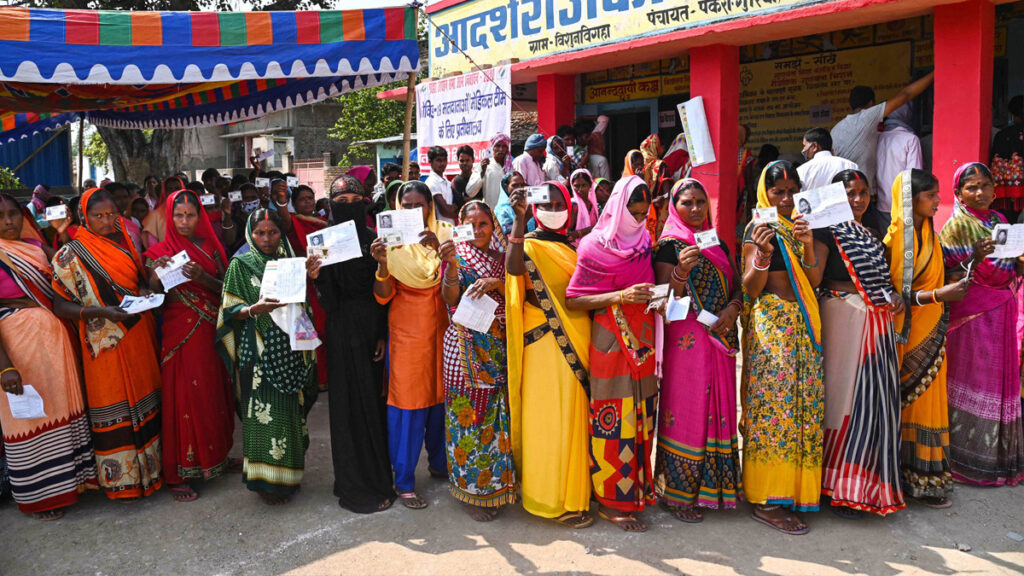Opposition Leaders Unleash Fury Over Alleged Electoral Fraud in Bihar
Nov 17, 2025 | Pratirodh Bureau
Women line up to cast their votes during the state assembly election in Bihar on November 11
In a crescendo of political indignation and resistance, opposition leaders across India have escalated their assault on the Bharatiya Janata Party (BJP), branding the party’s landslide victory in the Bihar assembly elections as a product of “vote theft,” rampant electoral misconduct, and a systematic erosion of constitutional principles. This backlash, ignited by Congress leader Rahul Gandhi’s accusations of widespread manipulation, has unleashed a torrent of allegations that threaten to deepen India’s political fissures, with leaders from the INDIA bloc rallying around claims of institutional betrayal and democratic subversion.
Samajwadi Party chief and former Uttar Pradesh Chief Minister Akhilesh Yadav emerged as a vocal critic, aligning himself with Gandhi’s narrative during a speech at the ‘Vision India: Startup Summit’ in Bengaluru on November 16. Dismissing the notion of mere “vote chori,” Yadav proclaimed, “It’s not chori… it’s a dacoity—done openly,” framing the alleged fraud as a brazen daylight robbery of democratic rights.
He argued that the issue transcended isolated incidents, representing a perilous shift in India’s electoral machinery. “Our vision is positive,” Yadav stated. “Theirs is division.” He also lambasted the “double-engine government” in Uttar Pradesh for exploiting communal tensions, warning of an impending “emergency” that could stifle India’s cherished diversity. “India is known for its diversity, but now one ideology is being forced upon people,” he cautioned. “This government is creating trouble for Hindustaniyat.”
Yadav’s remarks echoed Rahul Gandhi’s earlier allegations of deliberate disenfranchisement, particularly targeting minorities and backward communities. Gandhi cited the Aland constituency in Kalaburagi, where voter names were purportedly removed from electoral rolls, as emblematic of broader sabotage.
In the wake of the NDA’s triumph—securing over 200 of 243 seats—Yadav praised RJD leader Tejashwi Yadav as a “popular face” while decrying the ruling coalition’s divisive tactics. Touching on personal dynamics, he wryly noted family rifts in opposition circles becoming public fodder, contrasting them with the BJP’s concealed internal strife. “When disagreements emerge in their families, they become public spectacles, but such conflicts in the BJP’s house ‘never see the light of day,’” he quipped, though he insisted such matters were familial and universal.
Hundreds of kilometers away in Uttarakhand, newly appointed Congress state chief Ganesh Godiyal launched a scathing indictment, accusing the BJP of “buying” votes in Bihar through illicit cash transfers. “When Babasaheb Ambedkar drafted the Constitution, he never imagined governments would one day be formed by purchasing votes,” Godiyal declared, alleging Rs 10,000 was deposited into the accounts of 75-80 lakh women during the Model Code of Conduct.
He warned of similar strategies in Uttarakhand’s 2027 elections and unveiled Congress’s counteroffer: a “guarantee card” promising youth employment. Veteran leader Harish Rawat reinforced this, asserting the party’s leadership had the “collective strength” to oust the “corruption-ridden” BJP government.
Amid the uproar, Congress spokesperson Supriya Shrinate amplified the controversy with a viral video claiming a BJP worker voted in two booths. The Bihar Chief Electoral Officer demanded details and threatened legal action for misinformation, but Shrinate dismissed it as an “empty threat,” challenging the Election Commission to “wake up” and probe impartially. She questioned the BJP’s improbable 90% strike rate amid economic woes, labeling the results a “shattering” of the electoral system.
“The Bihar results are a shattering of the constitutional electoral system,” she said, accusing NDA leaders of multiple voting and voter bribery under the EC’s nose, including transporting supporters from Karnal by train.
MP Rajeev Shukla defended Gandhi against detractors, highlighting his relentless 15-day campaign during the Vote Adhikar Yatra and the INDIA bloc’s unity. “We faced not just a political opponent but ‘the open support of the Election Commission, the brazen use of money, and the full weight of the government machinery,’” he alleged, portraying the opposition’s struggle as a David-and-Goliath battle against entrenched power.
Rahul Gandhi himself described the outcome as “surprising” and insisted, “The election was not fair from the beginning.” Despite announcing an internal review, Congress leaders remain steadfast in their charge of institutionalized “vote theft,” arguing it undermines democracy’s core.
This wave of accusations has reverberated through India’s political landscape, drawing parallels to historical electoral controversies and fueling debates on electoral integrity. Analysts suggest the opposition’s strategy aims to galvanize support for future polls, potentially eroding the BJP’s aura of invincibility.
With investigations pending and legal battles looming, the fallout could reshape alliances and voter trust. As the INDIA bloc vows to intensify its campaign, the Bihar results stand as a flashpoint in India’s ongoing democratic discourse, highlighting tensions between power and accountability.
